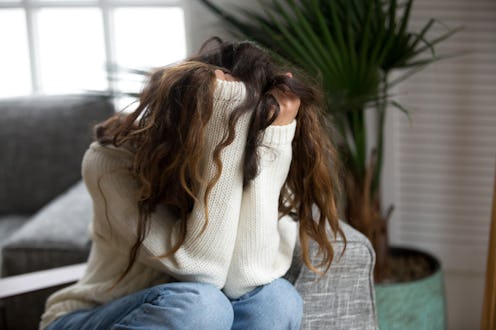Life
7 Signs Of Family-Related Anxiety In Your Body To Watch Out For Over The Holidays

Depending on people's family dynamics, the holidays can trigger signs of family-related anxiety in the body as a result of the conflicting emotions that frequently arise during this time. On the one hand, all the messaging around the holidays programs us to believe that it's a warm, loving, generous time when we're all supposed to be reminded of ~what really matters~. But for people with complicated family histories, going back home (or having everyone come over) is almost never the love-fest it's cracked up to be.
For plenty of people, spending time with family is not an environment in which they feel loved, supported, or affirmed — nor is it one in which they themselves are overcome with warm, fuzzy feelings of love and gratitude for these relationships. And even for people who don't have especially toxic families, run-of-the-mill anxiety around making sure everyone feels good and enjoys themselves during the holidays can hamper our own well-being.
"The holidays accelerate stress and anxiety for everyone," Dr. Fran Walfish, Beverly Hills family and relationship psychotherapist, tells Bustle. "Hosts want everything to go smoothly. Without intending to, they attempt to control the environment which sometimes includes family members. Frustration tolerance lowers, fuses blow, tempers flare, and feelings get hurt. Parents want their kids to behave showing perfect manners and kids want their parents off their backs."
Here are some signs that anxiety is creeping in on you to be mindful of during this time, according to experts.
1Tension Headaches & Muscle Tension
According to Dr. Lata McGinn, headaches are a common symptom, and frequently indicator, of anxiety. If you feel a tension headache or muscle tension coming on, it's often a physical sign that your anxiety is building up before you consciously notice that you're feeling anxious. Take a cue from these oncoming symptoms and scale back before you're stuck with a full-blown migraine in the middle of Thanksgiving dinner.
2Nausea Or Upset Stomach
The stomach-churning fear that a certain look or tone of voice from a parent can trigger is a deeply familiar feeling for most of us. According to Harvard's Women's Health Watch: "Ten to 20 percent of Americans suffer from the two most common functional digestive disorders — IBS and functional dyspepsia (upset stomach). In these disorders, the nerves regulating digestion appear to be hypersensitive to stimulation" — stimulation like the body's fight or flight responses to acute or chronic stress, fear, and anxiety. A digestive flare-up is a pretty good indicator that you're overwhelmed.
3Hot Or Cold Flashes
Part of the body's fight-or-flight response mechanism is to constrict blood vessels in your skin and gastrointestinal tract, while dilating the blood vessels in your skeletal muscles. Theoretically, this is to pump more blood into your muscles, thereby enabling superhuman feats of strength or for running away from predators at top speed. But when you aren't actually in physical danger, and these physiological changes are triggered by anxiety, they can result in hot and cold flashes that come seemingly out of nowhere.
4Restless Sleep
"Not sleeping well or needing more sleep than normal" are equally disconcerting signs to watch out for, licensed marriage and family therapist Nicole Richardson tells Bustle. Sleep and anxiety are in a little bit of a chicken-and-egg relationship with one another. Anxiety can cause sleep problems and new research shows that sleep deprivation can lead to anxiety, according to the Anxiety and Depression Association of America. So keep an eye on your sleep patterns and make sure to factor them in when you're trying to gauge the severity of your anxiety.
5Difficulty Focusing
"The process of picking up on external stress and having that impact your own stress level is quick and automatic, without thought or 'unconscious,'" says Dr. Walfish. "The person usually feels an immediate rise in anxiety and experiences a feeling of being taken over by their thoughts, worries, and fears. The anxiety takes on a life of it's own and the person feels they can't control their thoughts and emotions."
It's no wonder, then, that juggling other people's stressors as well as our own can result in difficulty focusing.
6Avoiding Things You Usually Enjoy
"Dreading or putting off things you typically enjoy" is another sign that you're seriously stressed out, says Richardson, and they're also symptoms of an oncoming depressive episode. Being gentle with yourself is important. But the endorphin-boost from your favorite workout or the soothing, repetitive motions of keeping up with your elaborate skincare routine are great opportunities for meditative reflection and keeping your body on its normal schedule.
7Making Up Excuses To Avoid People
If you find yourself "looking for or inventing excuses to be busy or avoid spending time with people," says Richardson, it might be an indicator that you're dealing with some unchecked anxiety. If you do set boundaries or request alone-time, make sure you're using that valuable space to confront your feelings, be honest with yourself about them, and feel them fully before heading back out into the fray.
"Ambient anxiety can have a cumulative effect," says Dr. Walfish. "The more times you experience it, the more susceptible you become next time you hear bad news." Ultimately, clocking body feelings is a great way to head off a total meltdown later, if you're being less than mindful of your emotions in a stressful moment.